How to start beekeeping

Three years ago I wrote a post on ”Start(ing) beekeeping” courses. That was mainly written from the perspective of the tutor. As with many posts on this site, it was read a lot at the time and then rapidly sank down the rankings, being overtaken by posts on swarm control, Varroa management and queen cells … all topics that should have been covered in a course on how to start beekeeping.
Hmmm? … I wonder why that is?
Today’s post is about the same topic, but from the perspective of the beginner.
What should you be doing and what should you not be doing?
What should you expect from your first beekeeping season?
This is different from what you might hope for.
It’s important that you manage your expectations (or someone manages them) as the alternative might well be disillusionment.
Hope for well-tempered bees, balmy summer days filled with the contented buzz of busy foragers {{1}}, and a whopping honey crop to jar for friends and family (and the local shops).
Expect disappointing weather, temperamental bees and possibly even lost swarms, several head-scratching ”WTF? I don’t understand … 🙁 “ moments, worry and – perhaps – some honey.
Nothing like enough to recoup your expenditure, insufficient for your family, let alone your friends, but enough to call yourself a beekeeper.
Except … not so fast.
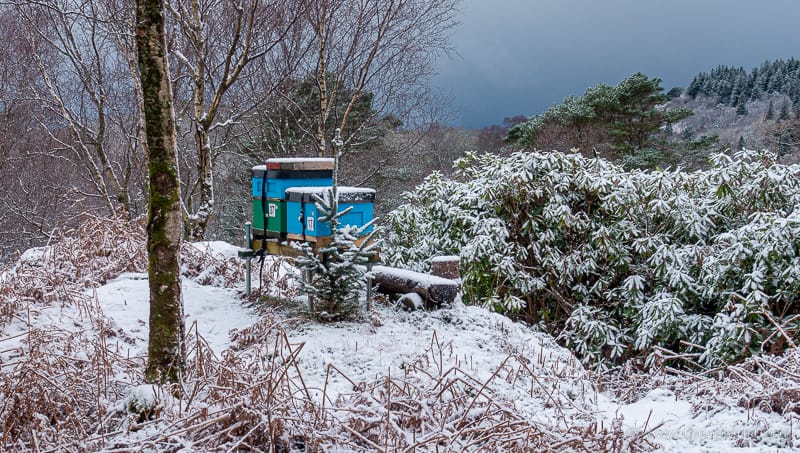
Hives in the snow
To call yourself a beekeeper I’d argue that you need to get your bees through their first winter.
This last part is so important it should be the primary goal of your first season.
Everything else is a bonus.
Beekeeping involves practical skills
And, unfortunately, you cannot learn these in a draughty church hall on alternate Wednesday evenings, or by reading and re-reading Ted Hooper’s Guide to bees and honey over the Christmas holidays.
At best you can learn the theory from books or from a beginners course.
The theory is useful, don’t get me wrong, but it’s no substitute for doing a few hundred hive inspections and keeping good notes over several seasons.
The books or a Powerpoint presentation cannot convey the weight differences between frames of stores, sealed or open brood, the subtle – and sometimes not so subtle 😉 – difference in behaviour of a queenright and queenless hive, or the physicality of colony inspections in high summer.
They can describe them, but that’s not the same as experiencing them.
One thing they are particularly poor at conveying is the feelings experienced when you open your first really full hive.
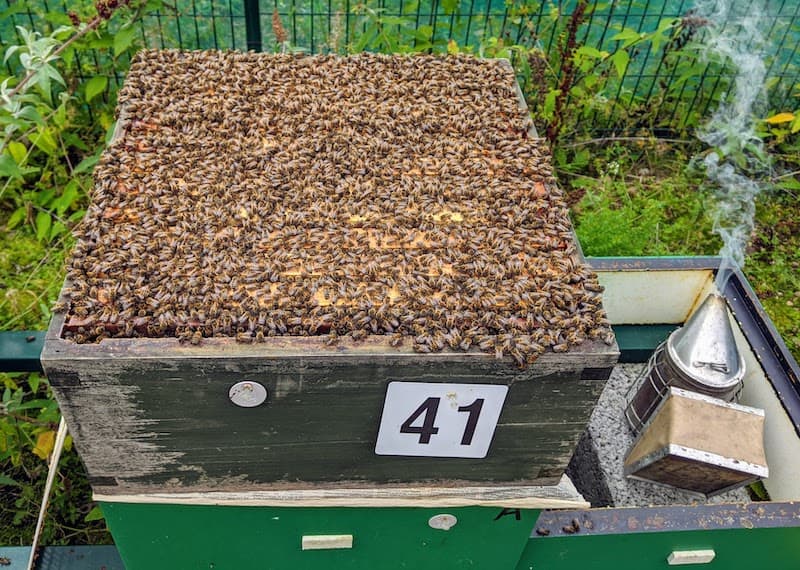
Lots of bees
For some ‘beekeepers’ this is the last beekeeping they do.
The ’sheer weight of numbers’ can be a bit overwhelming for some people.
They like the idea of being a beekeeper, but not the weekly interactions with tens of thousands of insects.
Beekeeping ‘taster’ days
Many local beekeeping associations run a ‘beekeeping taster day’ sometime in late spring or early summer. For £30 (or whatever … I’m probably hopelessly out of date) you receive a short introductory talk, before getting dolled up in a profoundly unflattering beesuit and shown the rudiments of using a smoker.
You then both observe and take part in a hive inspection.
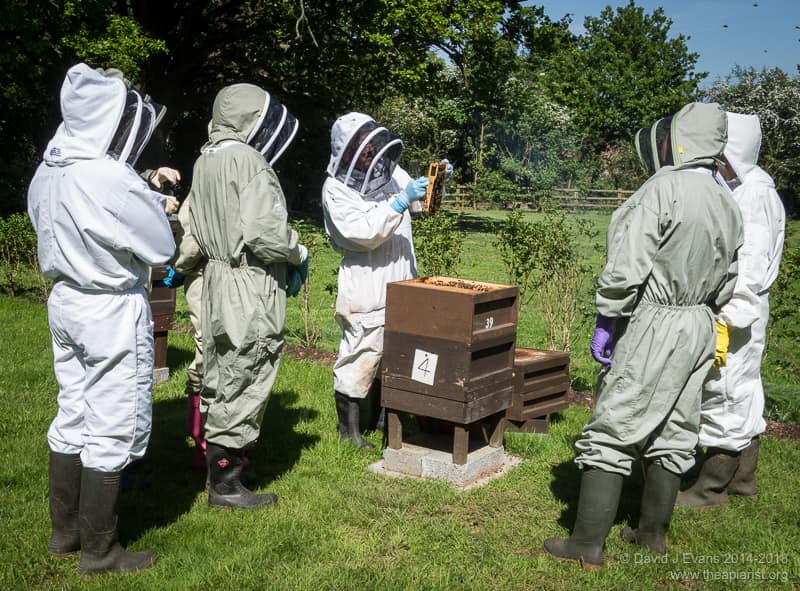
A tasty taster day
An experienced beekeeper will open the hive and talk you through the first few frames, but then you’ll be handed the hive tool and helped to ‘have a go’.
If you’re lucky the ‘taster’ day will end, appropriately, with a honey (and mead) tasting session.
I think these are an ideal way to see if you suit beekeeping.
If you recoil at the sight of thousands of flying, crawling, stinging {{2}} insects then you have the answer. Try watercolour painting, or metal detecting or mixed martial arts instead … and thank me for saving you the additional £970 it would have cost to get you started as a beekeeper.
However, if – as I hope – you find the sight and smell and sound of a hive captivating, if the hive inspection is finished well before you’ve asked all the questions you want to, and if you wonder why you’ve wasted the first forty years of your life as a watercolorist, a detectorist or a cage fighter, then Welcome! {{3}}.
These taster days have to be held when the weather is good and the bees are calm {{4}}, perhaps seven months before the winter ‘start beekeeping’ courses. It’s a pity they cannot be juxtaposed.
Join your local beekeeping association
Beekeeping is an essentially local activity. The bees forage within a radius of 2-3 km of the apiary. The available forage influences how the colony develops as the season progresses, the local weather determines which trees and flowers grow and produce nectar, and when that nectar is produced.
Local beekeepers know about these things and are best placed to provide help and advice. Any training they provide will be ‘biased’ (for want of a better word) to local conditions. They’ve dealt with the variably late springs, or the nectar dearth in June, or the ‘boom and bust’ nature of beekeeping in intensively farmed land.
Many beekeepers are very sociable, enjoying a long chat over a cup of tea and biscuits.
You might not be, and you don’t have to be, but access to the wealth of local advice will be invaluable during your formative months and years as a beekeeper.
I fully expect a comment to the affect
”Nonsense … I was given a swarm in a box in 1980 and am entirely self-taught. Never joined the local BKA and never wanted to. I learn from my mistakes and a library book {{5}}”.
All no doubt true, but that does not mean that the learning process wouldn’t have been smoother, or perhaps faster, with a little local assistance.
And it might have been a bit more enjoyable as well.
Remember also that the introduction of Varroa in ’92 made overwintering colonies significantly more difficult, and – three decades on – it remains the biggest problem for beekeepers.
You will also get ample opportunity to learn from your mistakes, even with help from the local association.
Attend a ‘start beekeeping’ course
Although I started by saying that, as a practical activity, you cannot learn beekeeping in a lecture theatre, the general principles of beekeeping are important and can be taught in classes, or learned from books. These principles include things like the:
- development cycle of queens, workers and drones
- fundamentals of swarm control (not the to and fro shuffling of boxes in a Pagden’s artificial swarm, but the principles that underpin most swarm control methods; separation of old workers and the queen from young workers and brood/queen cells … or preferably queen cell singular)
- apiary hygiene
- rational Varroa control and what happens if it is ignored
You can acquire all this knowledge from a good beekeeping book in the company of a wood-burning stove and a large glass of Barolo.

Homework
In fact, I’d strongly recommend you do this anyway.
But I’d also recommend you attend a ‘start beekeeping’ course run by your local beekeeping association. You’ll meet local beekeepers, you’ll make friends, you’ll get advice on equipment and apiaries and you’ll eat a lot of chocolate biscuits.
But I don’t think it’s necessary to attend one of these winter course before starting keeping bees. If your association runs evening/weekend apiary sessions and allows you to tag along then do so. Attend the course the following winter, but don’t delay the opportunity to do some practical beekeeping if offered the chance.
Get a mentor
If your local association does not offer some type of mentoring system then move house to an area with an association that does.
Use Rightmove or Zoopla to find somewhere suitable.
Clearly {{6}} I’m not being serious … but it does reflect how important I think mentoring is.
An association that doesn’t offer some form of active mentoring to all trainees underestimates the difficulties beginners experience and their need, over at least 1-2 seasons, to have some practical help and advice readily available.
Alternatively (or – even worse – as well), the association is offering too many places on the ‘start beekeeping’ course to provide the necessary follow-up support.
These courses can be lucrative; 50 places at £100 per person is a welcome boost to association coffers, but effective training involves more than 8 evenings in the church hall with tea and biscuits {{7}}.

No amount of chocolate biscuits compensate for a lack of mentoring
Are there 25-50 association members available and willing to provide mentoring for those beginners? Remember, the association probably ran the course last year for the same number … who will still need mentoring as they are probably about to get their first experience of swarming.
And, while I’m on the subject, can the association provide nucleus colonies to all the beginners they train? I think mentoring and the provision of nucs are important, and sometimes overlooked, responsibilities. I’ll return to nucs shortly.
Walk before you can run
Beekeeping is a broad church. All sorts of people get involved and there are all sorts of ways to keep bees. These include the type of hive used e.g. removable frame hives – Nationals, Langstroths, Smiths – top bar hives, skeps, tree hives etc and the methods used to manage the bees in those hives.
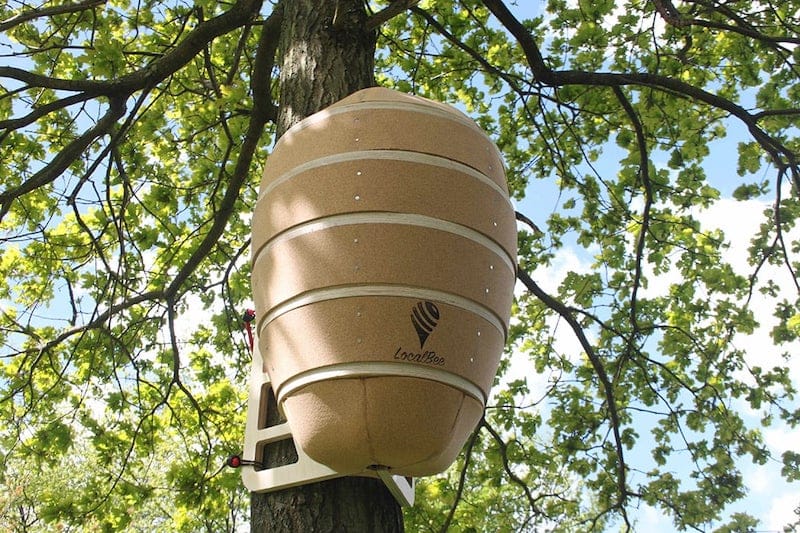
Perhaps try a National hive first … just sayin’
The majority of beekeepers in the UK use what I would consider ’standard’ management methods – a removable frame hive on which interventions for swarm control are employed and in which Varroa levels are minimised with appropriately used miticides.
But some beekeepers practice and promote others ways of keeping bees; encouraging swarming and avoiding the use of any chemical treatments.
I don’t think these management methods are suitable for beginners. Both are likely to result in the loss of colonies. Most swarms do not survive and it takes exceptional skill to keep bees without chemical miticide control.
I know some associations already promote ‘treatment free’ beekeeping on their winter courses for beginners. I worry about the survival rate of the colonies … and the proportion of beginners that eventually become beekeepers.
My suggestions would always be to learn to keep bees using the ‘mainstream’ methods before trying alternatives.
You might like the idea of keeping bees in skeps, eschewing chemical treatment and allowing them to swarm freely. After all, that’s more natural {{8}}. However, you’ll only become a beekeeper if you don’t lose your colonies through swarming or disease.
And if you do repeatedly lose your bees, you’re much more likely to become disillusioned with beekeeping and abandon it for something easier, like quantum physics or ultramarathons.
Become competent in the widely-used mainstream methods of honey bee management and then, by all means, try something different.
Learn one method and learn it well
I’ve discussed this topic recently. Learn the principles that underpin a management method e.g. swarm control, and learn one way of employing those principles to achieve a successful outcome.
Use it, and use it again.
Use it until it becomes second nature, until you can totally depend upon it working, until you understand all the subtleties and nuances, the wrinkles and caveats.
I see little benefit in an association teaching Pagden’s artificial swarm and the Demaree method and a nucleus method of swarm control. It might make sense to an experienced beekeeper {{9}} but beginners will inevitably get confused.
The winter course might feel more comprehensive, but if attendees are just getting bamboozled by all the options then it’s not really helping them.
Personally, although it’s slightly unusual in that it doesn’t exploit the separation of [old bees + queen] from [young bees + brood], I’d teach the nucleus method of swarm control. It’s easy to understand, uses a minimum of additional equipment and – done properly – is 100% effective.
You also get a ‘free’ nuc from it … which conveniently brings me to … {{10}}
Source local bees
Scientific evidence showed that, in a Europe-wide study, local bees did better than bees that were imported. The data indicated that they were better able to tolerate Varroa and that the colonies were larger when they went into winter. Other scientific evidence clearly demonstrates that strong colonies overwinter better than weak ones.
For these reasons alone it makes sense to source local bees when you start beekeeping. Buy a nuc from someone in your association, or offer to help your mentor for the season and get ‘paid’ with a nuc (you helped split) the following spring. An overwintered local nuc is probably the best option …
Alternatively, put your name down for a swarm and be prepared to go on a few trips to capture one.
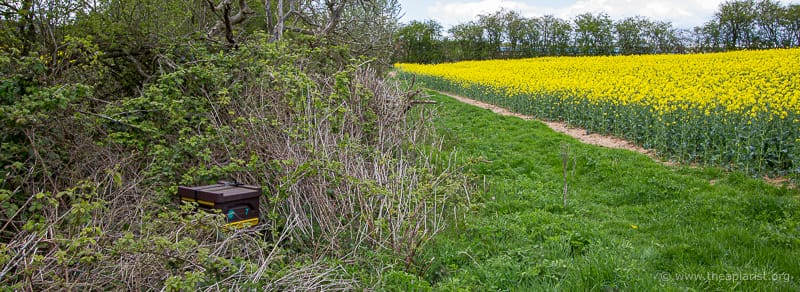
A bait hive deployed in mid-April in good time for the swarming season ahead
Perhaps also put out a bait hive and one might well come to you.
Over the last decade or so I’ve rarely encountered a really poor quality swarm. They certainly can occur, but the majority would – after a careful check of Varroa levels and other pathogens – be fine for a beginner.
Your mentor will help you with those checks … er, you have got a mentor, haven’t you?
Have patience
Don’t be in too much of a hurry to get your first bees.
Assuming ‘normal’ spring weather the difference in getting your bees in early April or late May is irrelevant. Neither will get you any honey from the spring nectar. In addition, the weather is often rather changeable in April making your first few, slow, careful hive inspections stressful for the bees as the brood gets chilled. You’ll hold the colony back and not gain much useful experience.
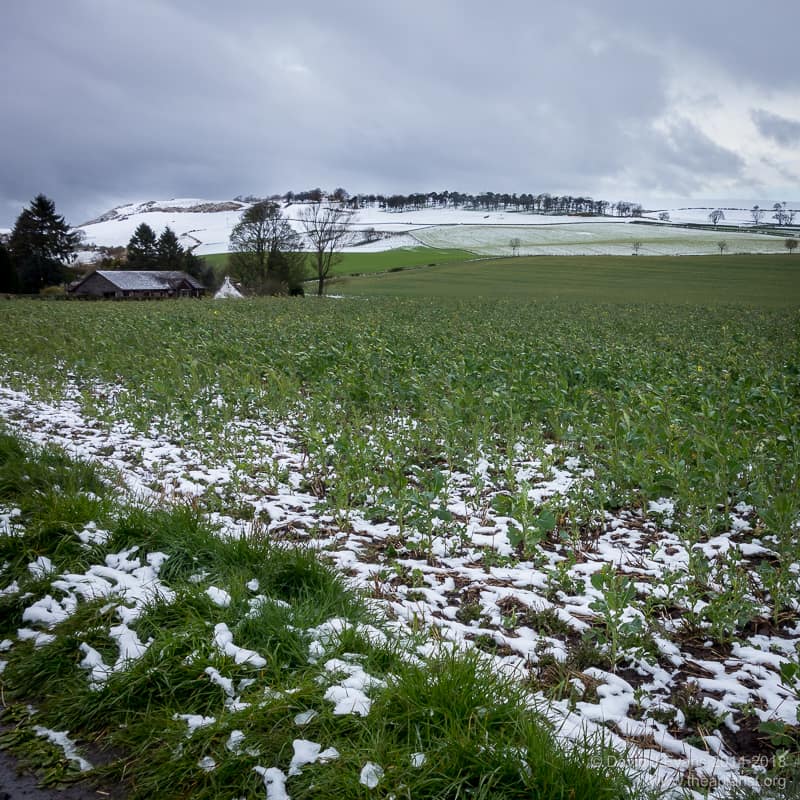
Late April 2016 … OSR and snow
Wait until the weather is better and nucs headed by a current year queen are available.
In Scotland that might be at least late June.
Of course, many beginners will choose to ignore this advice … they’ll order a nuc from one of the large commercial suppliers and collect it as early as possible. The bees may well not have been in the box very long, and the queen is likely to be imported.
By any definition these are not local bees … and they certainly won’t be in 3-4 weeks as all the bees will be then from the introduced queen. Will the seller provide help if things go awry?
The price of early-season nucs {{11}} reflects the demand, not necessarily the quality or suitability for a new beekeeper.
Your first season
I briefly touched on hopes and expectations earlier. Let’s finish by looking at a messy combination of these masquerading as what I consider priorities for the season:
- Successfully overwinter your colony. This has to be the priority as without it you have to start all over again. Successful overwintering requires three basic things:
- a healthy colony with low Varroa and virus levels
- a strong colony
- sufficient stores to maintain the colony through the winter
- Pathogen management, which 90% of the time means monitoring and treating (if needed) Varroa. Learn how to spot signs of virus damage and how to count mite levels in the colony. Understand the advantages and limitations of the various treatments that are available. Learn when to apply them for maximum effect, so that you use them as little as possible.
- Acquire the skills needed to judge the colony. Is it queenright? Are there the expected ratios of eggs, open brood and sealed brood? Is the colony expanding? Learn how to identify queen cells – even the carefully hidden ones – and to distinguish between play cups and charged cells. Try and understand the link between environmental conditions and colony temperament … which additional means you need to …
- Learn how to confidently and competently inspect the colony without overly disturbing or distressing the bees. Only then will you be able to distinguish between a clumsy inspection and a poorly tempered colony, or a usually well-behaved colony that is tetchy because it’s queenless (there are other, more definitive, signs) or because the nectar flow has dried up.
- 100 kg of honey per hive … if you’re gonna dream, dream BIG! In a normal season you should expect some honey from a spring-bought nuc, but consider it a bonus.
Your second season
Assuming you started the previous year with a late spring or early summer nuc (or a swarm) then this is likely to be the first season your colony will attempt to swarm.
Since it is preferable to have two colonies {{12}} – the comparative performance makes judging problems or environmental changes much easier – the logical thing to do is to use a swarm control method that creates a second colony.
The previously mentioned nucleus method, classic Pagden, or a vertical split will all readily achieve this.
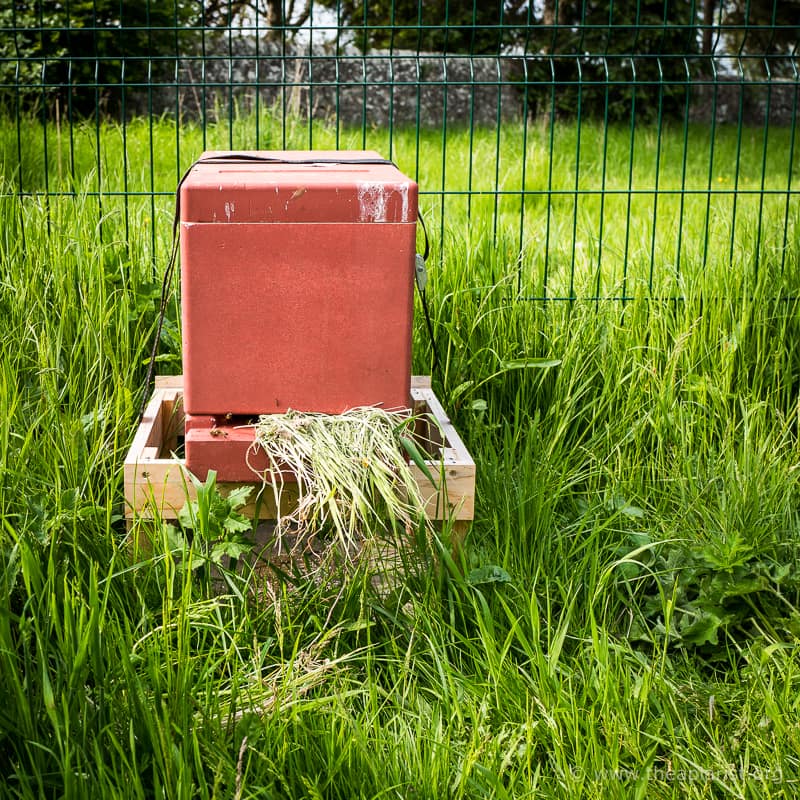
Here’s one I prepared earlier
What’s more, any of these three – conducted at the appropriate time for your local climate and forage – should barely interrupt the spring nectar collection. This means that you should get a spring and summer crop in many areas.
Apart from that it’s more of the same and steady as she goes.
Priorities 1-4 (above) remain equally important in your second season.
And sometime late in that second season, as you pile up the now emptied supers in the shed for year 3 (and consider buying an additional shed as you need the storage space), take a moment to congratulate yourself upon becoming a successful beekeeper 🙂 .
Don’t fool yourself that you know it all, or even that you know enough.
You don’t.
But I don’t either and I did all of the above about 15 years ago and am still learning.
Please support further articles by becoming a supporter or funding the caffeine that fuels my late night writing ...

Thank you
Facebook users
Blah, blah, blah … I don’t think anyone reads this far down and at least two people signed up to Facebook notifications last week. I’m pulling the plug on new post announcements on Facebook very soon {{13}} so please register instead on one of the social media links in the right margin – Twitter, Instagram or Mastodon.
Thank you
{{1}}: And perhaps hope for less of that sort of anthropomorphic nonsense.
{{2}}: At least potentially.
{{3}}: And be warned it’s going to take you ~15 years before your income from honey sales exceeds your imminent expenditure!
{{4}}: Or presumably they’d be called bad taster days.
{{5}}: The ABC and XYZ of Bee Culture … the 1877 edition by A.I. King, not the 42nd edition by Keith Delaplane and colleagues.
{{6}}: I hope.
{{7}}: Even chocolate ones.
{{8}}: So it must be better?
{{9}}: But, questioned carefully, often not complete sense!
{{10}}: Heck! It’s almost as though this was planned …
{{11}}: Perhaps £250 – £350 for current or overwintered respectively.
{{12}}: At least two, but I don’t want to spook you.
{{13}}: As I’m not prepared to spend £108/annum to post them automagically / Don’t know how to use Facebook / Am protesting about Trump being unbanned (delete those that do not apply – hint, it’s the last one).
Join the discussion ...